How to Prevent Coupon Abuse and Fraud in WooCommerce
These tips and tools will help you spot and prevent WooCommerce affiliate coupon abuse in your online store.
Searching for a way to prevent affiliates from misusing coupon codes in your WooCommerce store? This guide has your back.
Here, we’ll discuss:
- What WooCommerce affiliate coupon abuse means.
- Different types of affiliate coupon code fraud in WooCommerce.
- Actionable tips to prevent WooCommerce affiliate coupon abuse.
- The best plugins that handle much of the heavy lifting of stopping affiliates and customers from misusing coupon codes in your ecommerce store.
Plugins mentioned in this post:
- Coupon Affiliates: A powerful affiliate program plugin with tons of inbuilt anti-fraud features that automatically handle most of the heavy lifting of preventing WooCommerce affiliate coupon abuse.
- Better Coupon Restrictions: A simple-to-use plugin that lets you set precise rules and conditions that limit who, when, how, and how often coupons can be used in your WooCommerce store.
First things first, let’s outline what affiliate coupon abuse means and uncover common tactics fraudsters employ to misuse coupon codes in WooCommerce.
What is Affiliate Coupon Abuse in WooCommerce?
In WooCommerce, affiliate coupon abuse is a form of fraud that happens when affiliates exploit coupon codes to earn commissions they didn’t genuinely influence – often by manipulating your coupon system or hijacking legitimate sales.
There’s a direct impact on your profits when affiliates abuse coupon codes in the form of inflated affiliate payouts, a distorted view of your affiliate program’s ROI, and in some cases, chargebacks, lost customers, and even damage to your brand reputation.
Types of WooCommerce Affiliate Coupon Abuse
WooCommerce affiliate coupon code fraud can occur in various shapes and sizes. Here are the 4 most common tactics to keep an eye out for.
- Self-referrals
- Cookie stuffing
- Fraudulent purchases
- Fake deal listings
Self-referrals
Probably the most blatant form of WooCommerce affiliate coupon fraud, self-referrals occur when affiliates can use their own referral link to make purchases in your store then get the discount and pocket the commission.
They do this by creating fake customer accounts on your site or using their friends and family members’ details to place orders and then splitting the reward.
Cookie stuffing
With cookie stuffing, the affiliate creates a script that automatically injects their tracking cookies into the browsers of users who visit their website without their knowledge – even if the web visitor never clicks an actual affiliate link.
Cookies are usually valid for a few weeks or months. So when that customer later visits your store independently and makes a purchase, the affiliate gets the credit and subsequent commission.
Fraudulent purchases
Fraudulent affiliates can use their coupon codes and then pay for their purchases using disposable virtual cards, compromised credit cards, or stolen debit and credit cards to trigger their own commission payouts.
The orders may seem legitimate at first, but within days you’ll get chargebacks or product delivery failures. Worse, if your affiliate program allows, the affiliate may cash out commissions before the refund/chargeback window hits.
The result? You lose the product, pay the refund, paid-out affiliate commissions, plus any payment processor chargeback fees.
Fake deal listings
Affiliates can create fake “deal pages” to attract coupon-hunting customers – even if there’s no real discount or promotion running.
They do this by publishing search-optimized blog posts and landing pages that claim to provide coupon codes for steep discounts – think: “30% Off YourBrand Today Only” or “Exclusive Promo Code,” etc, when no such deals exist. Finally, they embed expired or fabricated codes with their affiliate links.
Some of these listings rank in Google or get reposted to deal sites. Customers then click through to obtain the falsely advertised discount and the affiliate gets credit for intercepting customers who already intended to buy.
How to prevent WooCommerce affiliate coupon abuse
In this post, we’ll discuss how to use inbuilt anti-fraud settings within Coupon Affiliates, our very own affiliate marketing plugin to prevent affiliates from misusing coupons in your WooCommerce store.
Not yet using Coupon Affiliates? Try out its free or pro version to put a stop to affiliate coupon code abuse now.
Don’t worry if you’re using a different plugin. Every first-rate affiliate plugin should have anti-fraud prevention features baked in so be sure to check your plugin’s documentation for specifics.
Read on for seven tips that will help prevent affiliate coupon abuse in WooCommerce.
- Block self-referrals automatically
- Vet affiliate program applicants
- Define coupon usage terms in your affiliate agreement
- Lock coupons to specific affiliates
- Set coupon usage limits and conditions
- Audit affiliate reports regularly
- Blacklist repeat offenders
Block self-referrals automatically
Coupon Affiliates empowers you to prevent affiliates from using their own coupon codes for their orders.
Once this setting is enabled, the plugin automatically checks the customer details on checkout, and blocks the code from being applied if it is their own.
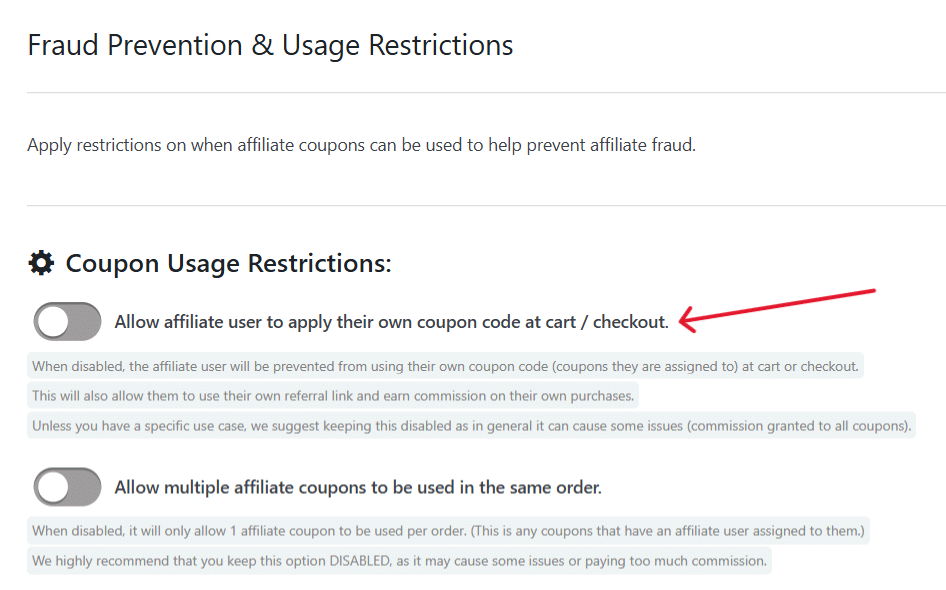
Vet affiliate program applicants
Carefully screen each applicant before you accept them into your affiliate program.
Tailor your affiliate signup form to collect details about applicants’ business type, promotional strategy, platforms they use, and more.
Then manually review their site, content quality, and audience relevance before you approve them.

Red flags to look out for include: no real web presence, use of disposable emails, or duplicate info across multiple applicants.
Use Coupon Affiliates to add relevant fields to your affiliate registration form and manually assign unique coupons only to approved users.
Define coupon usage terms in your affiliate agreement
Require affiliates to accept an agreement that details your affiliate program’s terms and conditions during the registration process to ensure they can’t claim ignorance if they break the rules.
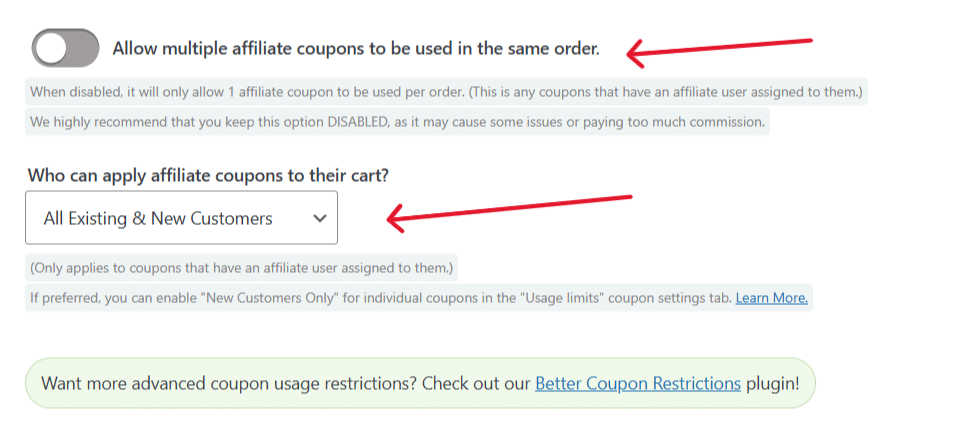
At a minimum, this affiliate agreement should clearly outline rules and restrictions regarding self-referrals, code sharing, affiliate paid search ads, payout timelines, unauthorized promotion channels, and prohibited traffic types.
The affiliate contract should also contain information about potential consequences affiliates might face, such as commission forfeiture, account ban, or legal follow-up if they violate the terms of the agreement.
Lock coupons to specific referrer domains
Tying each coupon to one referrer domain can put a stop to coupon theft and public misuse – so only sales tracked via their link or attribution settings earn a commission.
To set this up, create a unique coupon per affiliate, then enable the “Direct Link Tracking” feature, along with the option: Only allow affiliate coupons to be applied when directly linked by an approved domain.
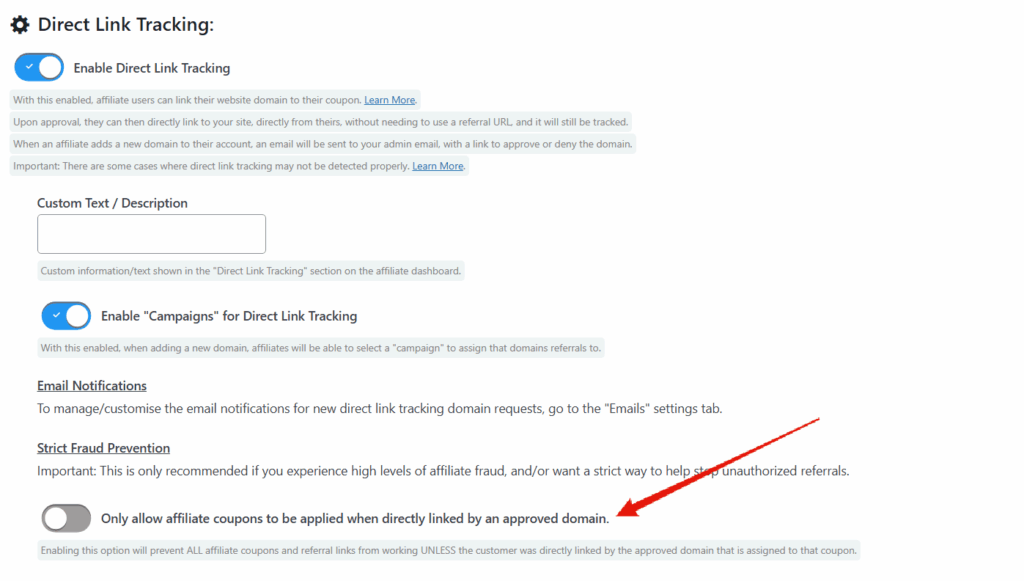
This protects against scenarios where a coupon ends up on a public site or extension like Honey, but the affiliate had nothing to do with the sale.
Set coupon usage limits and conditions
Enforce limits around who can use affiliate coupon codes, how often they’re used, and under what conditions.

Without proper restrictions, two or more affiliates can stack codes to split commission credit or trigger double payouts. Another example is when existing customers reuse affiliate coupons to obtain discounts on new purchases.
Coupon Affiliates settings are handy in both situations as it empower you to restrict checkout to one coupon per order and restrict coupon usage to first-time customers.
Audit affiliate reports regularly
Even if fraudsters manage to slip under your radar somehow, regularly reviewing your affiliate program’s performance reports can help you detect them.
Coupon Affiliates gathers and provides in-depth information about your affiliate program’s performance, including per-affiliate order data, customer info, IP addresses, and order patterns.
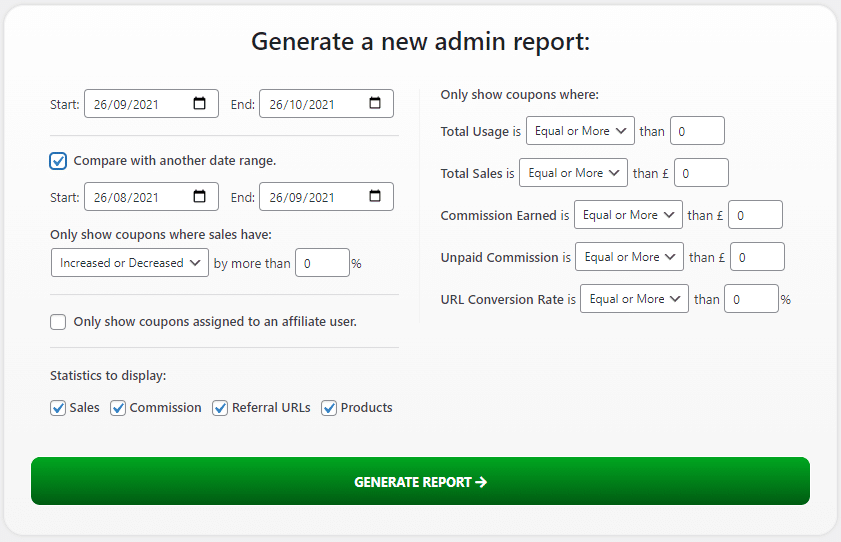
Here’s what to keep an eye on whilst auditing affiliate performance reports:
- Sudden spikes in usage for one coupon.
- Orders clustered in short timeframes with identical values or patterns.
- A high volume of new users with no referral traffic source.
- Duplicate names/emails, or IP clusters.
Blacklist repeat offenders
Some fraudsters just don’t quit. They use different emails, rotate IPs through proxies or VPNs, and employ other tactics to game your coupon system. So you need to block them at the store level.
You can use Coupon Affiliates “Visitors Blacklist” setting to flag specific IP addresses to prevent them from signing up for your affiliate program or using affiliate coupons.
The “Domains Blacklist” setting goes a step further to block customers referred by blocked domains from applying coupon codes to their purchases.
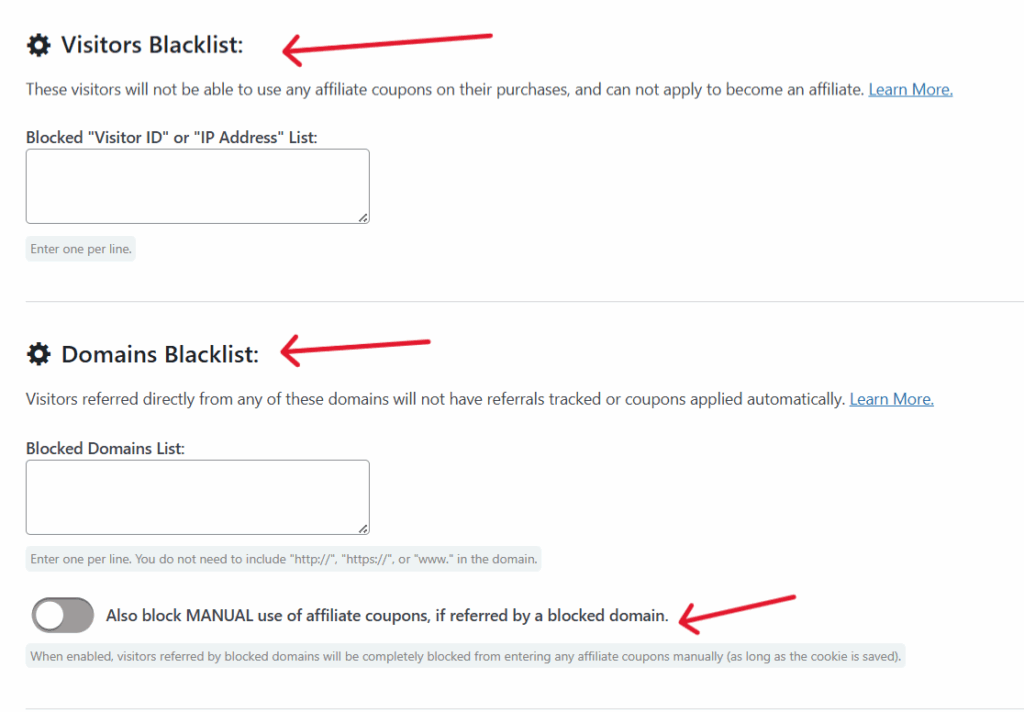
Bonus: Prevent coupon abuse and fraud in WooCommerce
You now know how to prevent affiliates from misusing coupon codes in WooCommerce. But what about preventing the abuse of “regular” discount coupons in your store?
WooCommerce allows you to create and manage coupons under Marketing → Coupons, and provides some inbuilt restriction features to limit misuse. For example, you can set up usage restrictions that control who, what, how, and how often a coupon can be used.
Even though the default limits cover basic use cases, they are rather rudimentary. For instance,
❌ No IP or device restrictions so customers can bypass per-user limits by using different email addresses or VPNs.
❌ No purchase history-based limits to block new signups who immediately use a discount code.
❌ No geo-restrictions to restrict coupon usage by customers in a particular address.
That’s where Better Coupon Restrictions comes in. It expands your control and allows you to set up detailed conditions that tighten your coupon strategy and protect your bottom line.
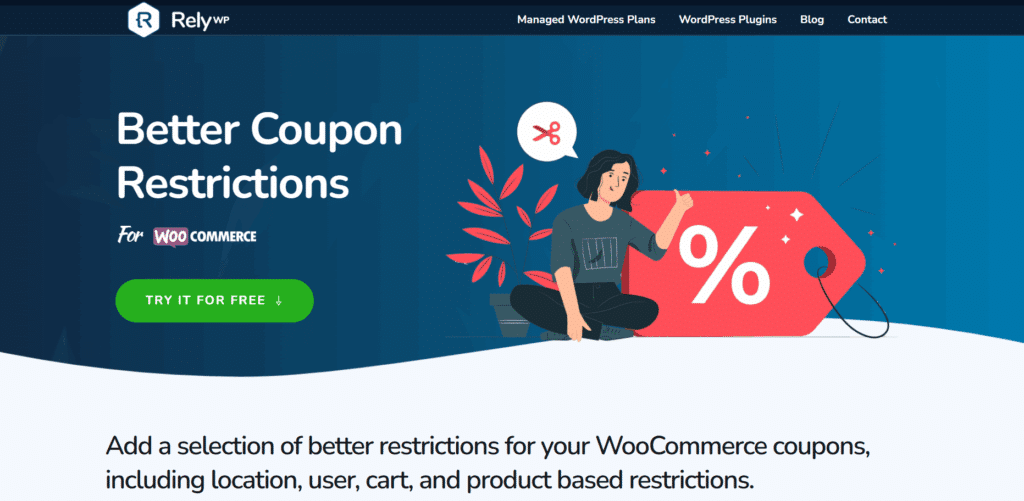
Better Coupon Restrictions empowers you to add a precise range of conditional rules that enforce who, when, how, and how often coupons can be used. You can, for example:
- Require customers to be logged in before applying a coupon.
- Only allow specific user roles – think: Wholesale Customers, VIP Members – to use a coupon.
- Set usage limits based on the number of orders a customer has placed or the total amount spent.
- Restrict coupon use by customers with a specific address.
- Specify the number of times customers with a specific billing or shipping address can use a coupon.
- Restrict coupon usage by customers referred from specific domains.
- Block coupon usage by customers with a specific IP address.
- Limit coupon usage based on the customer’s metadata or cookies stored in their browser.
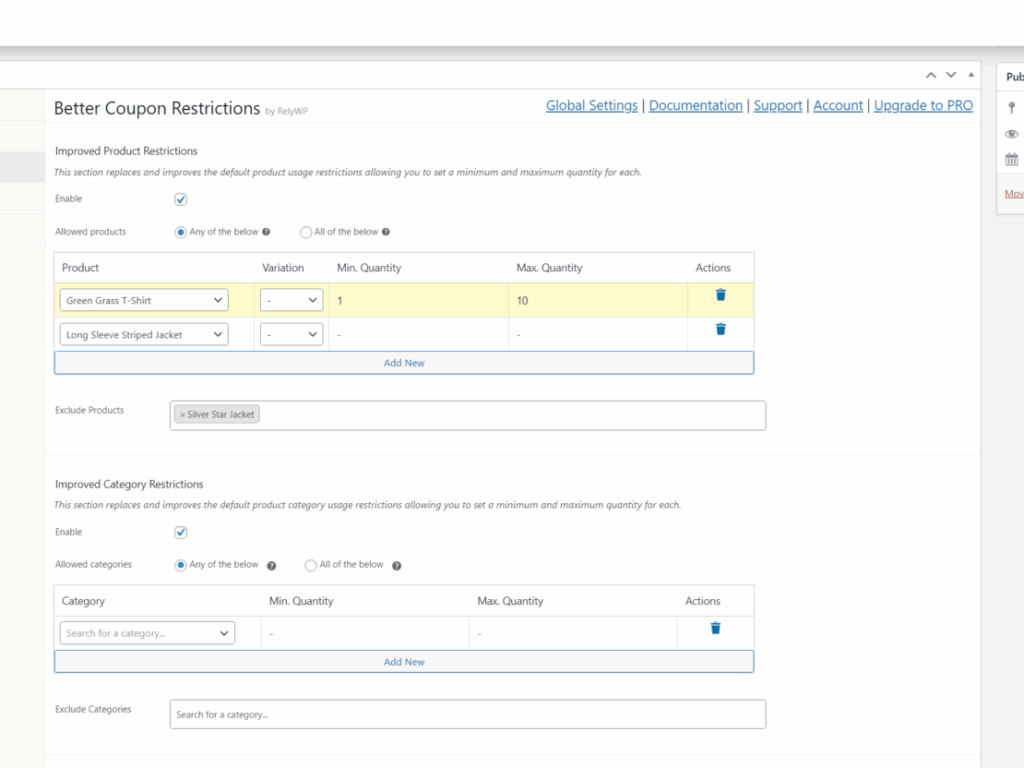
Check out Better Coupon Restrictions with its free or pro versions today.
Put a Stop to Affiliate Coupon Abuse
Left unchecked, affiliate coupon fraud can eat into your profit margins and damage your brand reputation.
The good news is that the tips shared in this post can help you uncover and prevent affiliate coupon abuse in your store.
Get the plugins mentioned in this post to nip coupon fraud in the bud with ease:
- Coupon Affiliates: A powerful affiliate program plugin with tons of inbuilt anti-fraud features that automatically handle most of the heavy lifting of preventing WooCommerce affiliate coupon abuse.
- Better Coupon Restrictions: A simple-to-use plugin that lets you set precise rules and conditions that limit who, when, how, and how often coupons can be used in your WooCommerce store.
Priyanka is a writer for WordPress and eCommerce companies. She loves breaking down complex ideas into simple concepts.

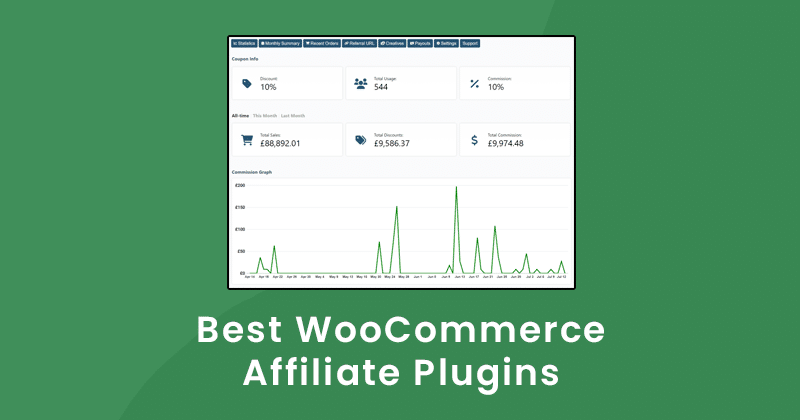


Leave a Reply